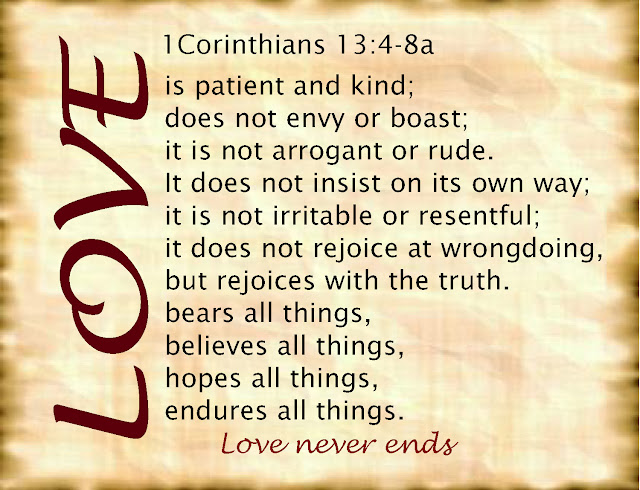How important is it to follow the Bible?
Let me give you an example. Let's look at the Apostle Paul's recording of 1 Corinthians chapter 13 and verses 4 through 8a.
- Love is patient, love is kind.
- Love does not envy, is not boastful, is not arrogant, is not rude, is not self-seeking, is not irritable, and does not keep a record of wrongs.
- Love finds no joy in unrighteousness but rejoices in the truth.
- It bears all things, believes all things, hopes all things, endures all things.
- Love never ends.
Those are some very powerful verses and sentences from God's word about love and how love is displayed. The old activity of putting your name in the place of the word "love" makes anyone humbled. I will put myself through that pain this morning.
- Adam is patient, Adam is kind.
- Adam does not envy, is not boastful, is not arrogant, is not rude, is not self-seeking, is not irritable, and does not keep a record of wrongs.
- Adam finds no joy in unrighteousness but rejoices in the truth.
- Adam bears all things, believes all things, hopes all things, endures all things.
- Adam never ends.
You can see how the exercise breaks down after a point because love goes from being a verb to a noun. The first verses are about how love is displayed with very specific actions. The last verses are about love in grander terms that points us to the only One who can fulfill the extremes of the "all" and "never" statements. God is love. So let's focus on the first verses.
- Is my life described as being patient?
- Is my life described as being kind?
- Is my life described as being the opposite of envy, boastful, arrogant, rude, self-seeking, irritable, and not keeping a record of wrongs?
- Is my life described as one rejecting sin and proclaiming truth?
I think anyone going through that list might have an "ouch" moment and maybe even a couple.
We might be tempted to make some excuses to rationalize our actions. We might want to describe our situation to make an exception for us. But let me give you the hard truth about this passage about love as a noun and a verb.
The hard truth is that when I exhibit the negatives of this passage to another, I am saying, "I don't love you."
- I can't love the other person when I am envying them.
- I can't love the other person when I am boasting of myself.
- I can't love the other person when I am being arrogant and playing king of the hill.
- I can't love the other person when I am being rude.
- I can't love the other person when I am self-seeking and pushing my agenda.
- I can't love the other person when I am irritable and allowing those emotions to do their damage.
- I can't love the other person when I am occupied by focusing on their wrongs with my own internal and maybe external "naughty" list on them.
- Do I really love other people?
- Do I seek to love them even if I have a sense that they don't love me in return?
- Do I abandon these default reactions of envy, boastful, arrogant, rude, self-seeking, irritable, and keeping a record of wrongs and ask God for help to show godly reactions of patience, kindness, and the loving of the truth?
What if you asked a good friend about this list and allowed them to speak truth to you about some "chinks" in the armor of your love? What if they didn't give you an "A" in all your classes? What would be your reaction? Would you jump to some excuses? Would you turn the tables on them even though you asked them to speak truthfully to you? Or would you be broken to backtrack, if able, and cover the sin with actions of love where you had been internalizing envy; being boastful, arrogant, and rude; promoting a self-seeking agenda; being irritable with others; and keeping a record of wrongs on others for future use?
How important is following the Bible to you?
Adam




Comments
Post a Comment